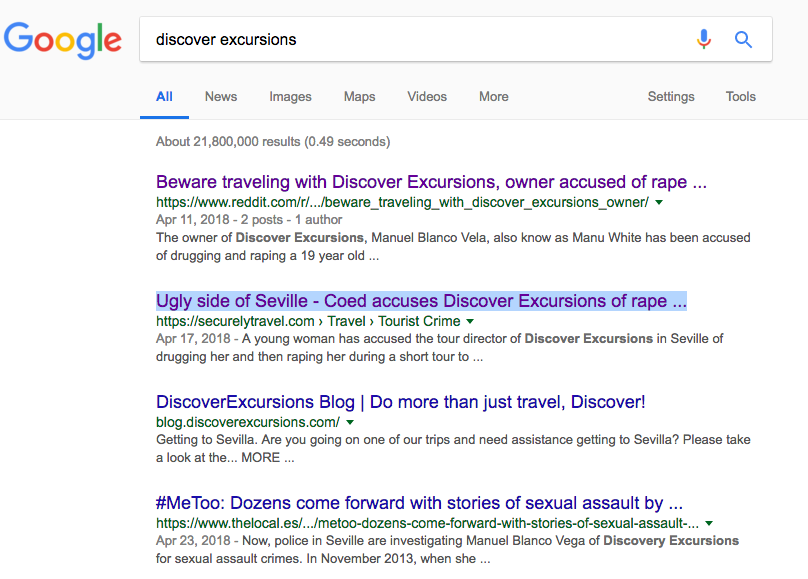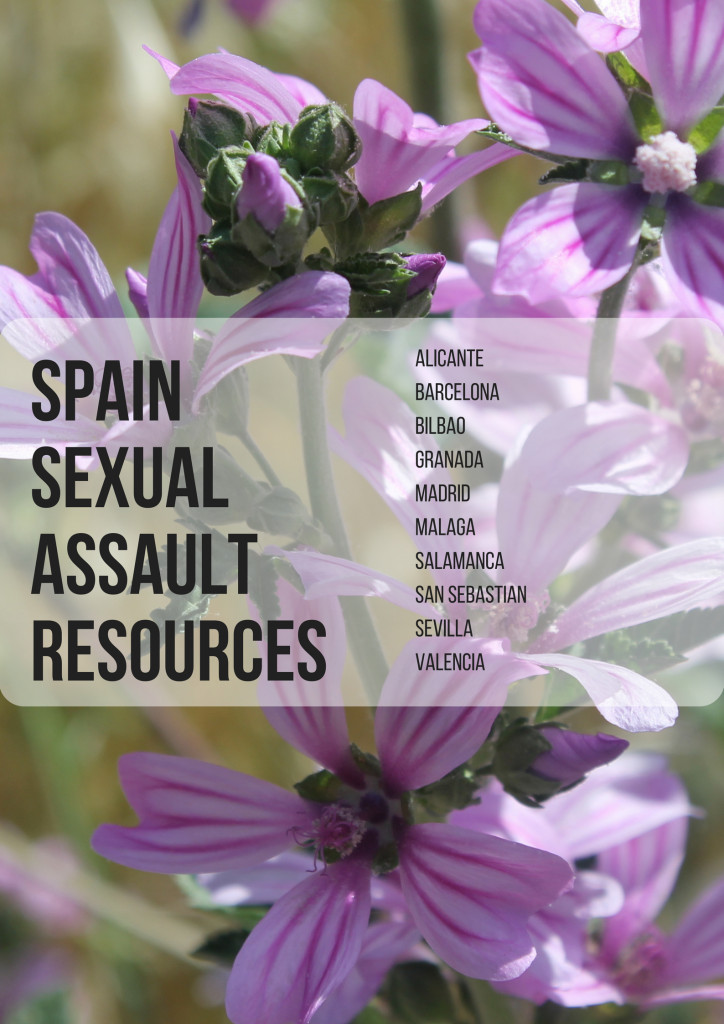On April 11th, 2018, the Today Show aired the story of Gabrielle Vega, a young woman who alleged she was raped while studying abroad in Spain. While on a semester in Salamanca, Gabrielle contracted the services of a student-run tourism company, Discover Excursions, to travel to Morocco. Given that Morocco isn’t the safest place to explore at night, one of the guides (and owner), Manuel Vela Blanco, invited Gabrielle and two friends to his hotel room for a drink. With his back turned, she alleges, he poured a glass of champagne.
The next morning, she woke up woozy and realized she’d been violated by the same person entrusted to keep her safe in Morocco.
I wish I could say I was shocked, but I wasn’t. Rumors have long swirled around Manu and his employees – I’ve been privy to them boasting about sleeping with multiple women a night – but he continued to run a successful tourism company whose target market was female study abroad students. I’m disgusted that I interviewed for Discover Excursions in 2009, the year Blanco Vela bought out the company and the rumors began emerging.
Since that date, more than 30 women have come forward with a similar story (not everyone was raped) and authorities in Spain are investigating the allegations.
I was deeply affected by Gabrielle’s testimony. Even as someone who has never been their client and much less their friend, I reached out to Gabrielle on social media and asked how I could help. Her request was simple: a list of resources for women who might find themselves in a similar situation. Working in higher education, I am familiar with Title IX reporting, with local resources in Madrid and how to file a police report – but there is not an extensive list.
I seek to provide that here. When I began this blog post in late April 2018, I had no idea of how reporting worked or that there was infrastructure in place to help victims.
Sadly, domestic violence and sexual assault are an everyday occurrence in Spain. Have you heard of La Manada, a group of men from Seville who were recently convicted of sexual misconduct after allegedly gang raping a woman at the San Fermines festival in 2016? Spain is behind the times when it comes to handling sexual assault and rape charges, and even something supposedly harmless like cat calls are commonplace – but citizens are thankfully speaking out, and each autonomous community has resources for victims – from hotlines to pamphlets to volunteers.
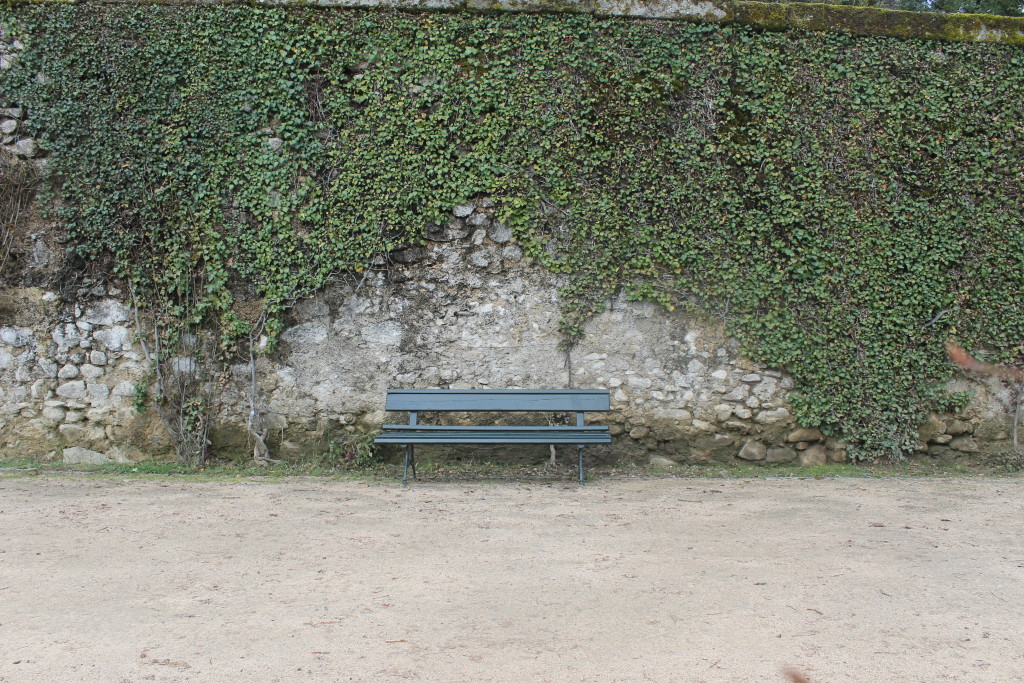
Please share the information about where to go if you are the victim of a sexual assault, of sexual violence, or of rape while in Spain. Even if you think it will do no good to denounce someone while abroad or you feel ashamed to report, now is the time that we must speak up. Below you will find a growing list of resources for the major study abroad cities, which happen to be many of Spain’s largest. If you have further information, please comment or email me so that I can update the list.
What constitutes rape or sexual abuse in Spain?
It’s helpful to know a little bit about law in Spain regarding sexual abuse, gender violence and rape, which is under fire with the La Manada conviction. Spanish penal code defines both sexual abuse (abuso sexual) and rape (violación) as an act against a person’s sexual liberty.
Much like a robbery or petty theft, there is a heavier penalty when violence is exercised against the victim. This could be through intimidation or force but can be difficult to prove – and this is exactly why the Manada, a group of five guys who gang raped a woman during the San Fermines festival, were let off. Worse, they filmed the rape and planned it ahead of time, sharing the crime on a whatsapp group.
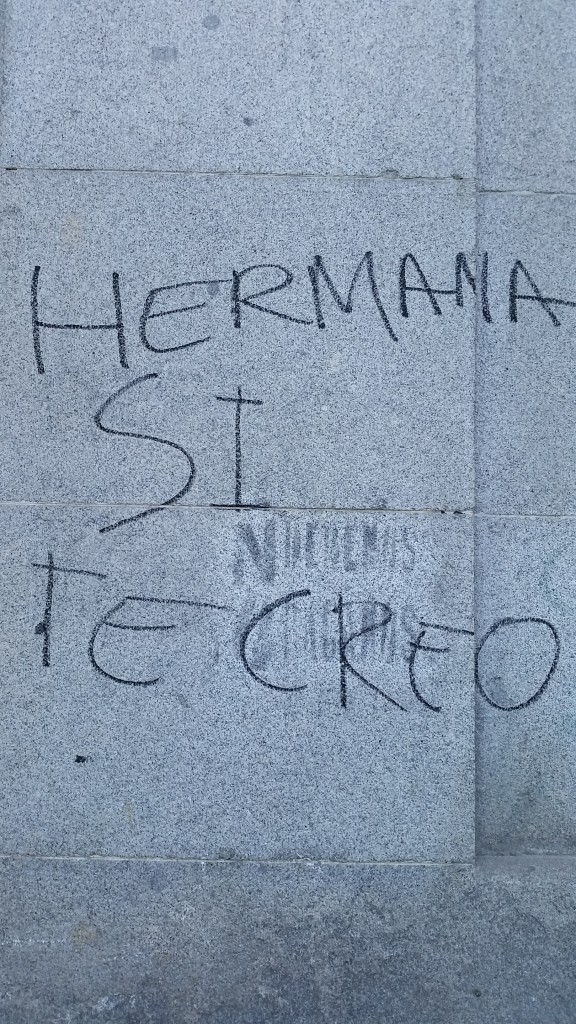
The jail time associated with each is from one to five years if there is evidence of violence; if not, the maximum prison time drops to three years. Like I said, Spain is a little behind the times when it comes to punishing these sorts of crimes.
Spain-wide resources
If you are the victim of a sex-related crime in Spain, follow these steps immediately after the crime and making sure you are ok (better to have a trusted friend and preferably one who speaks Spanish):
- Have a medical examination performed. The word for rape in Spanish is violación, and you should keep a copy of the medical report for the police report.
- File a police report (denuncia) at a National Police Station.
- Contact the Servicio de Atención a mujeres víctimas de Violencia de Género (Support Service for Women Victims of Gender-based Violence, herein referred to as S.A.V.G.) – 24 hour service, where you will receive specialized social, psychological, and legal support and where they will help you to come up with a safety plan for potential risk situations. This service is available 24 hours a day, 365 day; the number is (+34) 900 222 100 and is free to the caller. You may also use this service if you are not a legal resident of Spain or in an “irregular” residency situation. Email is savg24h@madrid.es.
The emergency number in Spain (similar to 911) is 112. The hotline for women who have been physically or sexually abused is 016. Both hotlines are free to call and are available in several languages (some lesser-spoken languages are only available from 8am – 6pm during the work week).
If you are the victim of any sort of crime in Spanish territory (this includes Ceuta and Melilla), you are strongly encouraged to fill out a police report. This is called a denuncia, and it can be filed at any National Police (policia nacional) station, which are open 24 hours a day. Here is where to file a police report. Be sure to be as descriptive as possible, bring an ID with you and, if you feel your Spanish is not up to par, bring someone who can translate.
You can file in person, via telephone (at a cost) to 902 102 112 from 9am until 9pm. Victims of sexual abuse or rape cannot file a police report of this nature online. If the crime was committed outside of Spain but involves a Spanish national, it may be hard to file a report and you may get pushback – but that shouldn’t stop you from trying.
In Spain, gender violence, also known as domestic violence or violencia de género, is investigated and prosecuted via the Ministry of Health, Social Services and Equality (Ministerio de Sanidad, Servicios Sociales e Igualdad), they have an informational sheet about your rights (mostly directed towards victims of violencia de género). The Guardia Civil is tasked with investigating violent crimes against women and minors as part of the EMUME program. They have an office in each province, which you can download here. In addition, there is a Spain-wide toggle search of resources according to the type of service you are looking for, as well as geographic location.
I cannot tell if ATENPRO still exists and whether or not it is a program funded by the Spanish government or by the Red Cross of Spain.
Your country’s Embassy or nearest consulate will have resources, too, and it’s understood that the consular agents are tasked with protecting the interests of their constituents. Most Embassies are located in Madrid (a full list is available here) and many have consulates around Spain. The US has consulates in Spanish territory in Barcelona, Seville, Valencia, Fuengirola (Málaga) Las Palmas de Gran Canaria and Palma de Mallorca. Andorra is also under the jurisdiction of the US Mission to Spain.
The US Embassy website and American Citizen Services in Spain – including emergency services – can be found here. You can also request a translator through ACS.
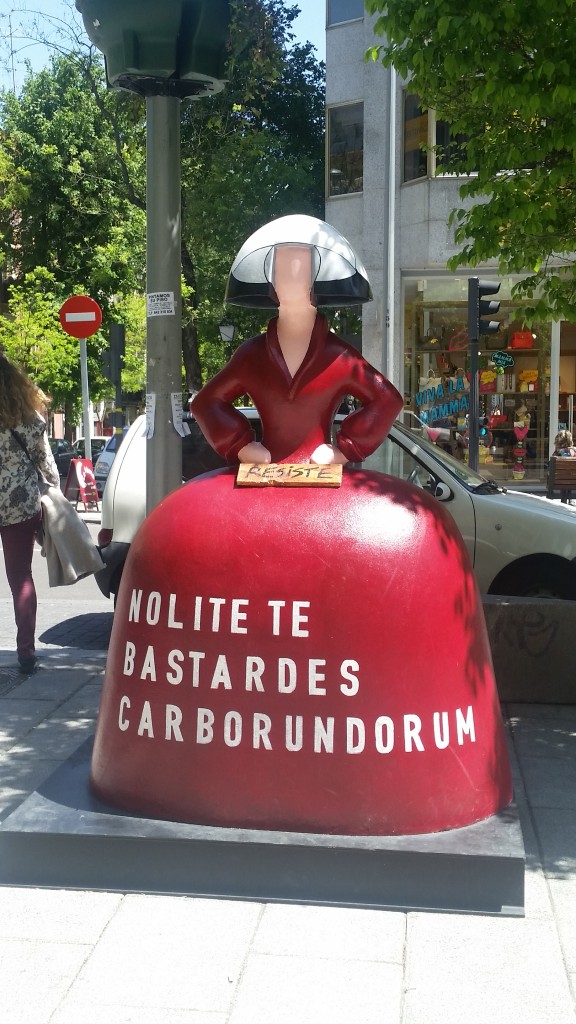
Additionally, most major cities have a branch of the Instituto de la Mujer (Spanish only). You can read about your rights in the event of a crime via an online contact form or find information about legislation in Spain regarding sexual harassment and asault. The organization is headquartered in Madrid on Condesa de Venadito, 34. The nearest metro stop is Barrio de Concepción (Line 7), or you can take bus 53 from Puerta del Sol. Below, I detail the contact information of the Instituto de la Mujer in popular study abroad and touristic destinations.
The city of Madrid has put out a short pamphlet (in English) about where to go and what to do if you have been assaulted or raped. Further, Red Ormiga provides assistance to undocumented immigrants, including in cases of rape or sexual violence.
If you suspect you have a sexually transmitted disease, called an enfermedad de transmición sexual, you can have a test performed at any public clinic, so long as you are registered through an empadronamiento.
Important: if the person harassing or violating you has access to your computer or phone, always clear your browser history. Many websites listed on this post will also have a button called “salida rápida” which will allow you to close the page quickly. I, unfortunately, do not.
Finally, you can choose to do online counseling via Better Help. If you are in Spain with health insurance, check out your options, as many programs will allow you to see a therapist as part of your coverage.
Pathways to Safety: an overseas resource for Americans abroad who have been victims of sexual abuse, rape or aggression
American victims of sexual assault and violence have access to a toll-free crisis phone number. Dial the country code first, which for Spain is 900-99-0011. After dialing the country code, the victim will be prompted to dial the hotline’s direct number, which is 833-SAFE-833 (833-723-3833).
Important: For calls on a mobile phone, the call should be deleted from the call history log for safety reasons. On a landline, they should first hang up the receiver, then pick it up and dial another random number and then hang up again. This prevents someone from redialing, and this can help you stay safe at the hands of a person who is hurting you.
The phone number is for immediate response. You also have the option to email a crisis case manager at crisis@pathwaystosafety.org
Pathways to Safety seeks to help victims of interpersonal and gender based violence, including domestic violence, sexual assault, dating violence, stalking, and forced marriage. At this time, they only help Americans who become victims while abroad in ways like safety planning, legal aid services, counseling, and transition and basic needs assistance either in a foreign country or back in the United States, whenever possible.
You could also contact RAINN – the Rape, Abuse and Incest National Network headquartered in the USA. They have an 800-number and a live chat in the event you are a victim or would like to consult the statute of limitations.
Resources for sexual crime victims in popular study abroad destinations in Spain
Madrid
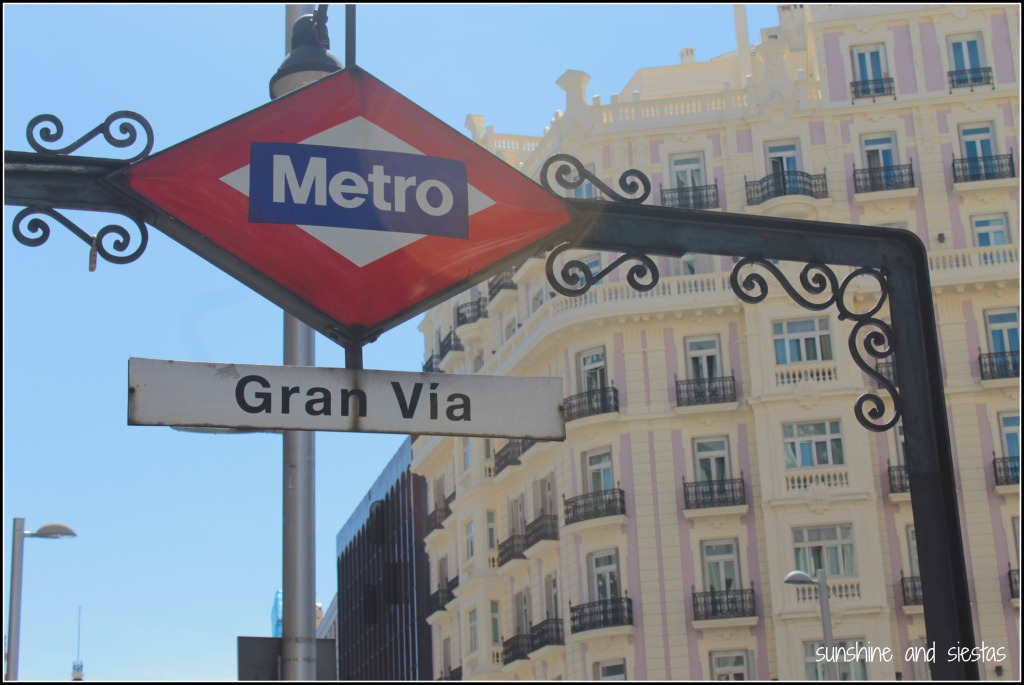
- APUNE – an organization of American university programs in Spain. They are located on General Martínez Campos, 24,between the Iglesia (Line 1) and Gregorio Marañón (Line 7) metro stops. +34 91 319 91 18.
- SINEWS – a multi-lingual counseling company offering support for victims. Their offices are at Sagasta, 16 on the ground floor. Nearest metro stops are Bilbao (lines 1 and 4), Alonso Martínez (Lines 4, 5 and 10). +34 91 700 19 79; +34 60 926 93 23 is the emergency line.
- Asociación Asistencia Mujeres Violadas – a non-profit that provides psychological and legal support to rape victims at Calle Alcalá 124, 1º A. Metros are Manuel Becerra (Lines 2 and 6) and Goya (lines 2 and 4). +91 574 01 10; asociacion@cavasmadrid.es.
- Servicio De Atención A La Mujer (Sam) – a newly-formed division of the National Police tasked with investigating violent and sexual crimes. The Madrid-based headquarters is located in the Comisaría de Policía at Avda. Doctor Federico Rubio y Gali, 55; Metro at Francos Rodríguez (Line 7). +34 913 22 34 21.
To file a restraining order, you can do so at the located at the Comunidad de Madrid Dirección General de la Mujer at Calle Madrazo, 34, 3rd floor. The nearest Metro is Banco de España (Line 2); +34 91 720 62 38: or at C/ Manuel de Falla 7 , 2ª pta. (nearest metros are Santiago Bernabeu and Cuzco, both on Line 10) +34 91 720 62 38.
This is saddening but also necessary: In Madrid, you can now share where and by whom you were assaulted on this interactive map via Free to Be Madrid. I urge you to share your story, in English or Spanish.
Andalusia: Sevilla, Málaga and Granada
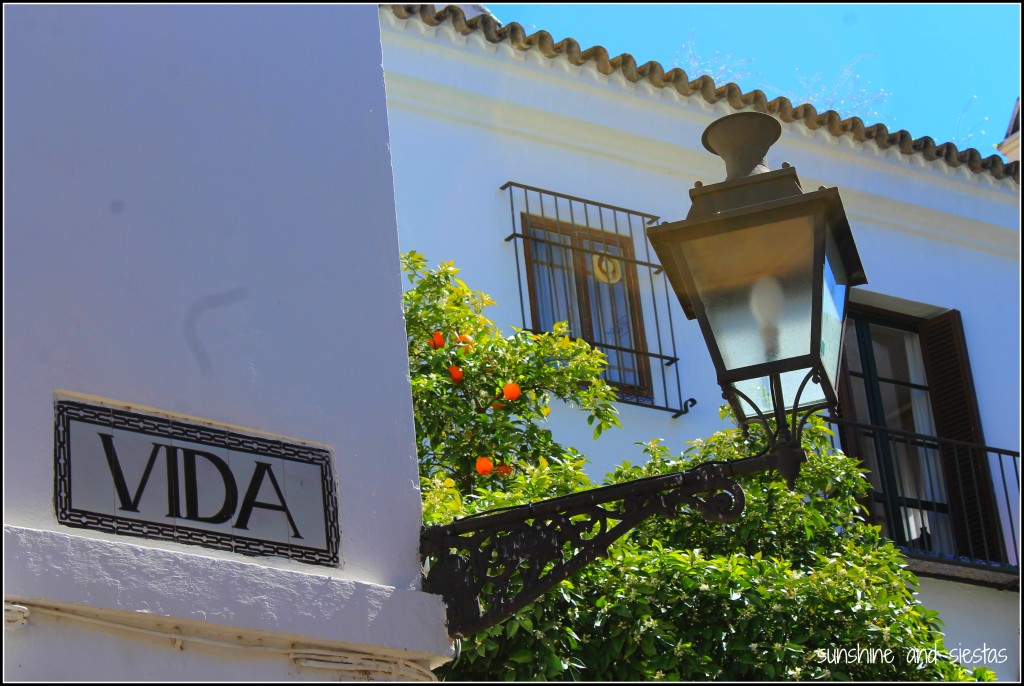
In Sevilla (as well as Granada, Málaga and any other town in Andalusia), the Ministerio de Sanidad, Servicos Sociales e Igualdad and the division known as the Instituto de la Mujer are responsible for overseeing resources for reporting and attending to victims. The autonomous community-wide ministry is located in the capital of Seville at Avenida de Hytasa, 1, +34 95 500 63 00; the central office for the Instituto Andaluz de la Mujer for the entire comunidad is located in the center of town at Doña María Coronel, 6: +34 95 454 4910, consulta.iam@juntadeandalucia.es.
That said, you can find information about the Instituto de la Mujer in each province of Andalusia, as well as their satellite offices in other municipalities in the same link. The organization provides shelters and psychological help for victims of gender violence, as well as health and employment training.
| Córdoba
Centro Provincial Instituto Andaluz de la Mujer Córdoba Avda. Ollerías nº 48 (14071). Teléfono: 957 003 400. Fax: 957 003 412. |
Granada Centro Provincial Instituto Andaluz de la Mujer Granada C/ San Matías, 17 (18009). Teléfono: 958 025 800. Fax: 958 025 818. |
| Málaga
Centro Provincial Instituto Andaluz de la Mujer Málaga C/ San Jacinto, 7 (29007) Málaga Teléfono: 951 040 847. Fax: 951 040 848. |
Sevilla
Centro Provincial Instituto Andaluz de la Mujer Sevilla C/ Alfonso XII nº 52 (41002). Teléfono: 955 034 944. Fax: 955 035 957. |
- The Servicio de Asistencia de Víctimas de Andalucía is a gender-inclusive psychological and judicial support service for victims of crimes – which includes foreigners, tourists and minors. There are offices in each province of Andalusia and the Campo de Gibraltar, and their services are listed in their English-language pamphlet.
- The Costa del Sol chapter of Soroptimist International is active, championing for women’s issues and providing support in nearly four dozen languages.
There are US Consulates in both Sevilla (Plaza Nueva, 8) and Fuengirola, a town to the west of Málaga (Juan Gómez Juanito, 8).
Castilla y León: Salamanca
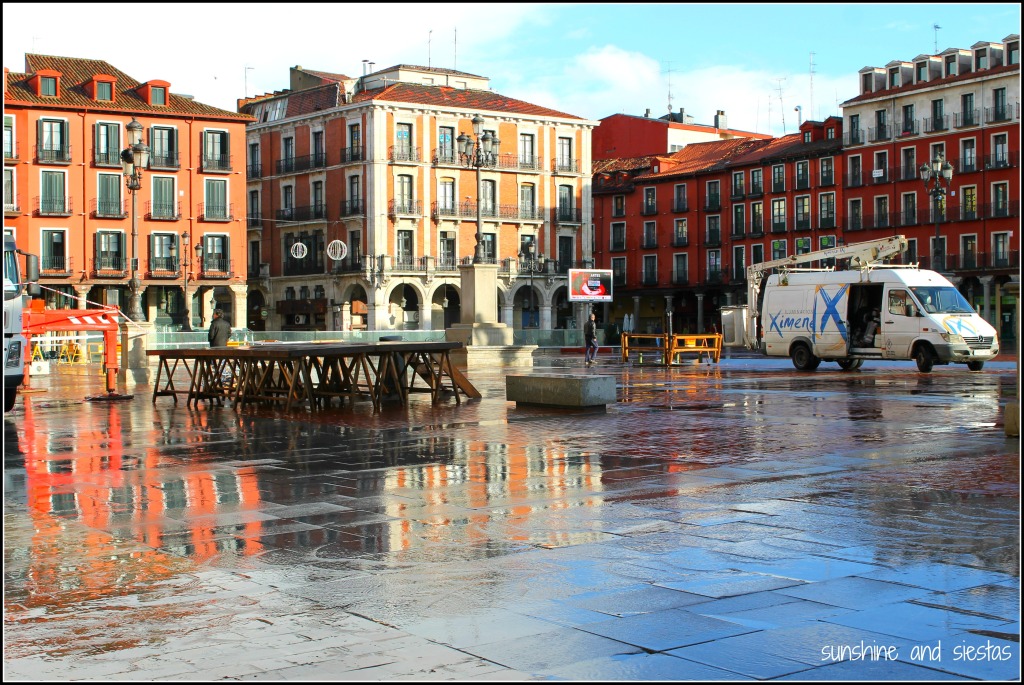
While the Junta de Castilla y León is located in Valladolid, where I chose to study abroad in Spain, the capital isn’t home to a plehora of Erasmus students or co-eds on a semester overseas. The regional government provides a list of resources under the Health and Social Services Ministry and runs a program known as PAWLA to bring resources straight to victims of gender and sexual violence.
The Sección de Mujer of Salamanca – home to one of the world’s oldest universities and a destination for abroad programs, it located in the Edificio Administrativo de Usos Múltiples (ESAUM) on C/ Príncipe de Vergara, 53-71 – Planta Baja; (+34) 923 296 746 or (+34) 923 136 458. This governmental organism also provides help to family matters and those dependent on drugs; the list of satellite offices is found on the Familia, drogopendencias y mujer section of the Junta de Castilla y León’s website.
The central office for the Centro de Acción Social (CEAS), which deals with citizens in crisis, is located in Valladolid, but a simple Google search will yield the office nearest you – even if you’re not in a provincial capital. They will be able to direct you to more resources and translators, if needed.
Finally, the Asociación de Asistencia a Víctimas de Agresiones Sexuales y Violencia de Género is active in Castilla y León and partially funded by the regional government. León, Valladolid and Burgos are of note; the Salamanca office is located at C/ Corral de Villaverde, 1, 5ºB; the office phone is (+34) 923 26 05 99 or the 24-hour (+34) 609 83 53 36.
Cataluña: Barcelona
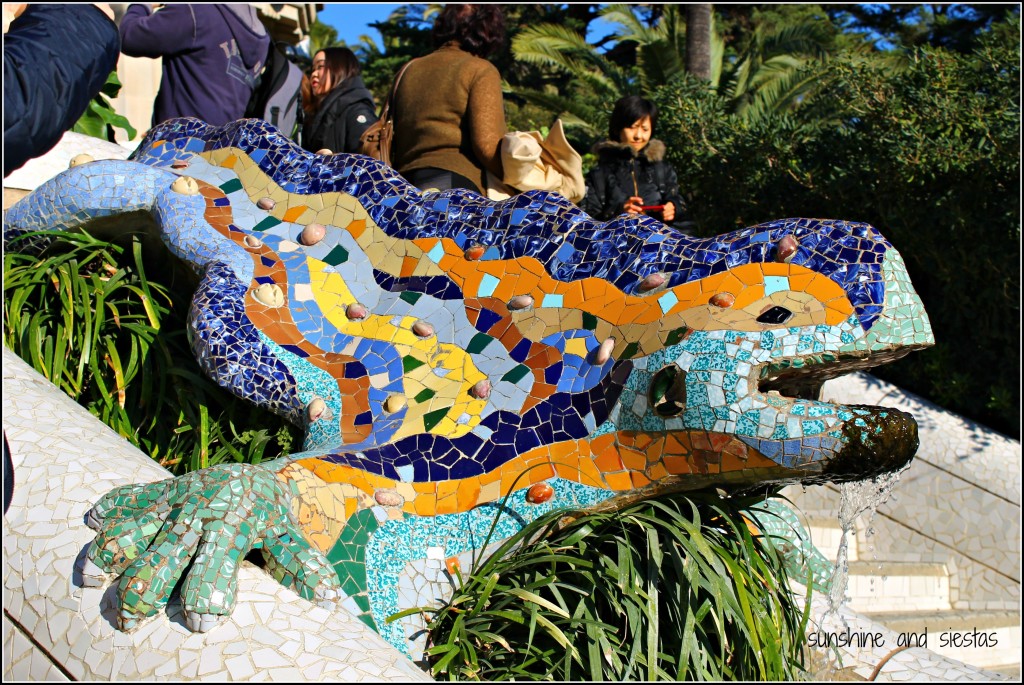
Many will argue that Catalonia is not Spain, but the northeastern region of the Iberian peninsula is also known for being one of the more progressive. A simple Google search for this post brought back a number of resources for victims of sexual crimes, including free therapy sessions for victims of sexual crimes during youth, monetary compensations for victims and a number of organizations meant to protect and support victims.
While the official language of all of Spain is Castillian Spanish, it’s more common to hear catalán or inglés. That said, if you speak in Spanish in larger urban areas, you will be attended to in Spanish. Keep in mind that, at the time of publication, local law enforcement is upheld by the Mossos d’Esquadra, a division of the Civil guard whose day-to-day operations are run by the Catalan government. Within Catalonia, the emergency number 012 will connect you to the Mossos; you can also dial (+34) 932 14 21 24 outside of the region.
Like all other regions, you should follow the protocol of calling the police, having a pelvic exam and making a denuncia, as outline in this PDF about sexual assault and rape put out by the catalán government. To file a police report, the Mossos Denuncias page describes how and where to do so around the comunidad. And bravo to the Catalonian government’s website that has clear instructions and resources for the whole region, the most relevant of which are listed below.
The general hotline for victims of sexual crime in Catalonia is: (+34) 900 90 01 20 (24/7).
Two major hospitals in Barcelona will treat victims of sexual assault and have specialized units for their emotional and psychical treatment:
The public Hospital Clínic de Barcelona is one of the largest treatment centers in the region, and in addition to an ER and psychological units, treats victims in the Programa de Prevención y Tratamiento de las Secuelas Psíquicas en Mujeres Víctimas de Agresión Sexual c/ Rosselló, 140, bajos; (+34) 629 63 45 53. Note that the aforementions unit is only open Mondays, Tuesdays, Wednesdays and Fridays from 10 am until 1pm. Hospital Sant Joan de Deu has a Unidad de Agresiones Sexuales for sexually abused minors. Ctra. De Esplugas, s/n: (+34) 932 80 40 00.
- Catalonia’s Instituto de la Mujer is part of the Minsterio de Bienestar y la Familia. Their page regarding sexual crimes is in catalán, but you can find the office at Plza. Pere Coromines: (+34) 934 95 16 00; icd@gencat.cat
- The Oficine de Atenció de Víctimas de l’Delicte (OAVD) is a division of the Ministry of Justice that can help you with legal matters related to sxual crimes.Gran Via de les Corts Catalanes, 111. Edificio I. planta 3ª; (+34) 900 12 18 84 (toll free); atenciovictima.dji@gencat.net.
- The Servei d’Atenció, Recuperación i Acollida (SARA) goes a step beyond by offering refuge to women, children and anyone who has been the victim of sexual violence as well as anyone in their family o immediate circle.. It is a division of DONA. C/ Marie Curie, 16: (+34) 932 91 59 10; sara@bcn.cat
- Associació Assistència a Dones Agredides Sexualment (AADAS) provides survivors with legal and psychological support. (+34) 934 87 57 60; http://www.aadas.org.
Finally, there is a US consulate with select Embassy powers in Barcelona in the Sarrià neighborhood at Paseo Reina Elisenda de Montcada, 23; (+34) 93 280 22 27; the Ask Citizens Services email is barcelonaacs@state.gov. The nearest subway station is Reina Elisenda (the end of Line 12).
Communitat Valenciana: Alicante and Valencia
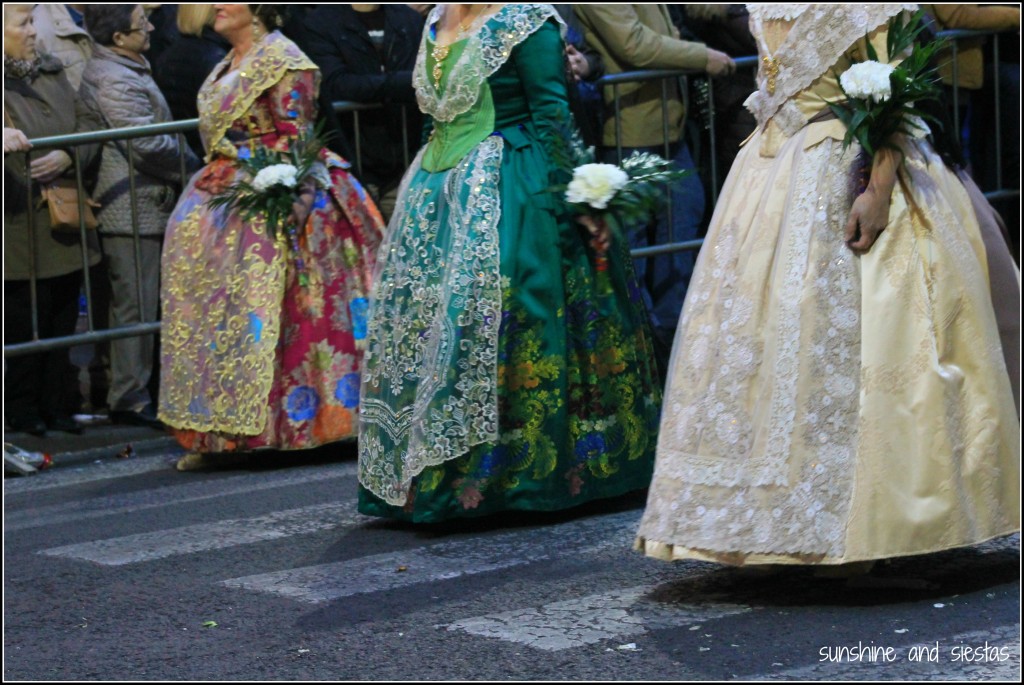
In Valencia, the Instituto de la Mujer is overseen by the Consejería de Bienestar Social and, at a more local level, the Dirección General de Familia y Mujer. Unfortunately, many of the websites and associations listed on the Consejería’s website were broken or out of date (the Plan of Action was last updated in 2012 and only gave actions through 2014, for example). You can reach the central line, operative 24 hours a day, at (+34) 900 58 08 88 or (+34) 900 152 152 for the hearing impaired. The Generalitat also lists police commissaries that have special attention to victims of sexual assault.
You may find that some services operate first in valencià, a language closely related to catalán. Those organizations with pages in English have been added here, though the most complete information will be in valencià or castellano.
- Institut de les Dons in the Comunitat Valenciana is located on C/ Castán Tobeñas, 77 in the Ciutat Administrativa 9 d´ Octubre, torre 3; (+34) 961 24 75 89; mujer_web@gva.es. Closest metro is Nou d’ Octubre (lines 3, 5, 9).
- Their counterpart Alicantina, la Coordinación La Dona, is on Av/ Oscar Esplá, 33-35 in Alicante. (+34) 965 92 97 47.
- The Centro de Asistencia a Víctimas de Agresiones Sexuales is likely to give more support. While they do not have resources in English on their webpage, they are a reference in Spain for their pioneering work in support for victims and are right in the center of town. C/ Guillem de Castro, 100; (+34) 963 94 30 69; info@cavascv.org.
- The Asociación para la Protección e Integración de la Mujer provides services for immigrants, particularly for victims of abuse. They are headquartered in Valencia at C/ Baron de Carcer, 48 8L; asociacionprim@hotmail.com.
Further, the Generalitat offers economic help to survivors who meet certain socioeconomic conditions, such as residency and income. This page is in Spanish, as well as the online platform to apply.
There is a US Consulate near the Colom metro stop on Carrer del Dr. Romagosa, 1, 46002; (+34) 963 51 69 73.
País Vasco: Bilbao and San Sebastián
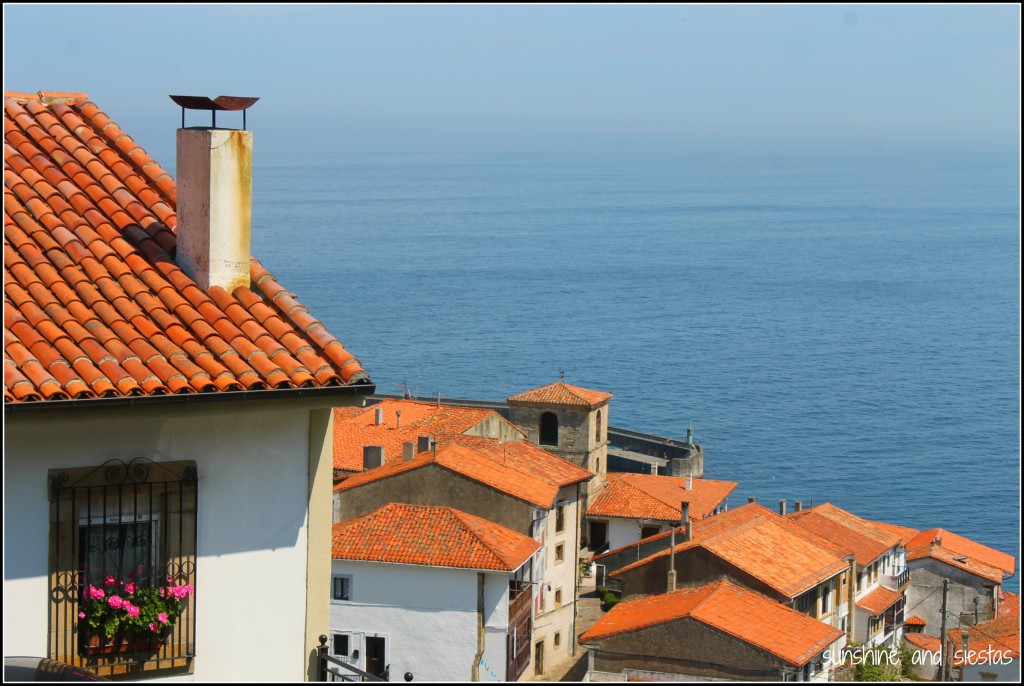
Like Catalonia, the Basque country has a higher degree of autonomy; their police force is known as Ertzaintza. Again, although the official language of the whole country is Castillian Spanish, you may find that resources or services are in euskera first; the Ministry of Justice does have an informative pamphlet in English about the steps victims should take, as well as contact information for the following resources and services.
- The Specialized Information Service and Hotline Service For Female Victims of Domestic Violence (S.A.TE.VI.) is available around the clock for confidential information and support at (+34) 945 01 93 27 or (+34) 945 01 93 16; violenciacontramujeres@euskadi.eus. The hearing and speech impaired can get assistance by sending a text message to (+34) 600 12 31 12 with personal details and location, by typing the words “gender violence”.
- The Servicio de Asistencia a la Víctima (Victim Assistance Service, or SAV), is service which provided by the Basque Government that offers information and the social, legal and psychological assistance. They have limited hours, so you should call authorities outside of normal business hours, taking into account reduced hours and staffing in the summer months.
| Bilbao
Palacio de Justicia Ibáñez de Bilbao, 3-5 (+34) 900 40 00 28 (free phone) (+34) 944 01 64 87 |
San Sebastián
Palacio de Justicia Plaza Teresa de Calcuta, 1 (+34) 900 10 09 28 (free phone) (+34) 943 00 07 68 |
- The Instituto Vasco de la Mujer is known as Emakunde in the Basque language, and their services also extend to men who have been victims of sexual crimes. The main office is located in the Basque capital of Victoria-Gasteiz (+34 945 01 67 00); emakunde@euskadi.eus. They have a website in English and have listed their protocols in a helpful PDF (in Spanish). I could not find information about satellite offices in the comunidad.
